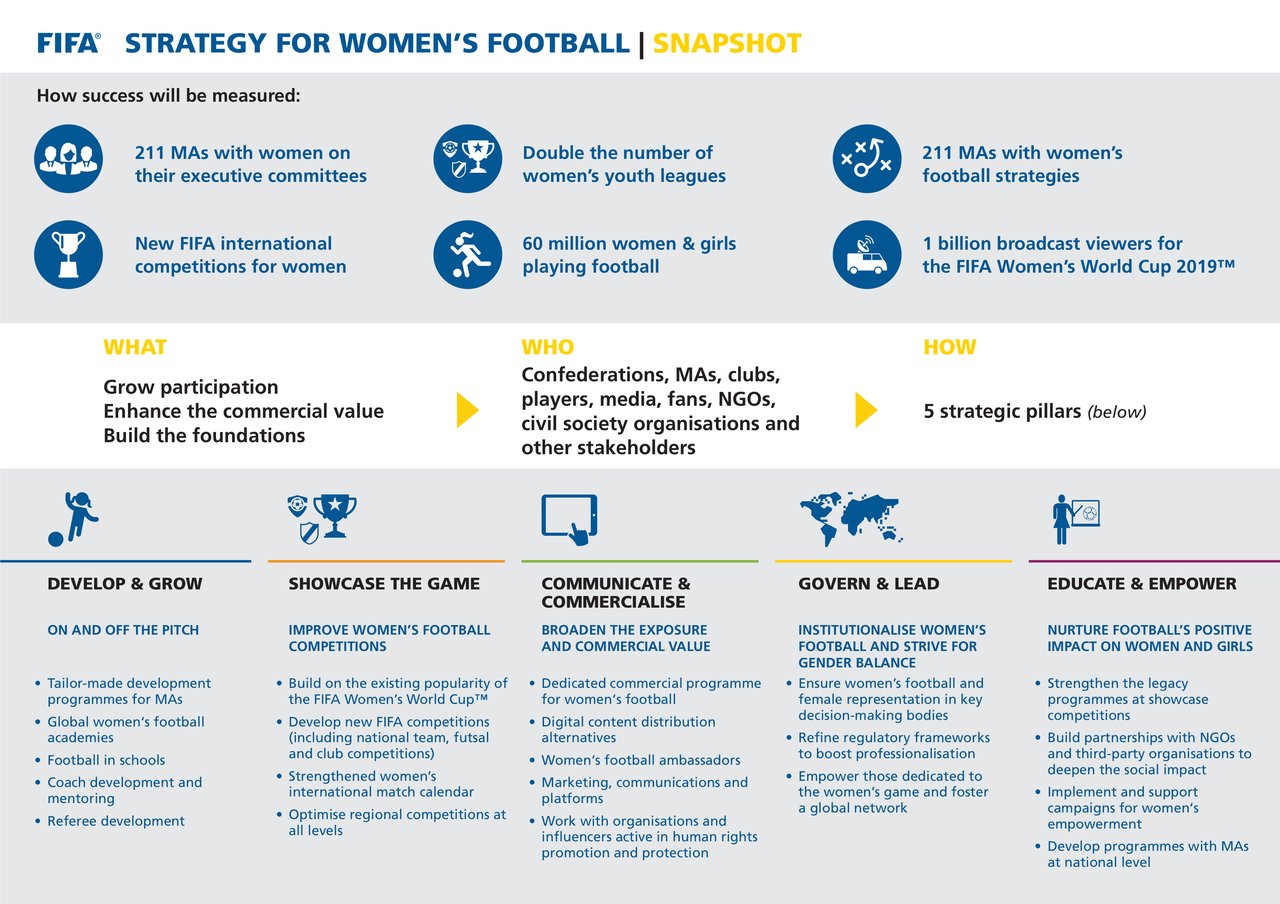A new strategy to promote gender equality through football
In July last year, over half the world's population tuned in to see France beat Croatia in Moscow to be crowned the 2018 FIFA World Cup™ champions.
Twelve months on, and France will once again be the centre of attention as it is all set to host the FIFA Women's World Cup 2019™, women's football flagship tournament.
Women's football has grown steadily in recent years with record levels of investment in women's football projects contributing to the creation of new leagues and competitions and increasing participation.
The professionalisation of the game means that female players are increasingly able to earn money playing the game they love, and since the introduction of the FIFA Women's World Cup™ in 1991 and the subsequent launch of U-20 and U-17 tournaments, the level of play has improved dramatically, media attention has increased exponentially, and the game has gained popularity.
The 2015 edition of the FIFA Women's World Cup™ in Canada drew unprecedented interest: more than 750 million fans from all around the world tuned in to watch the tournament on TV and 1.35 million spectators bought tickets to watch it in the stadiums.
The event created nearly half a billion dollars of economic activity in the host country, and the USA v. Japan final was the most watched football match in US history.
Seven matches during the tournament attracted crowds of 50,000 spectators and a total of nine billion impressions were recorded on Twitter.
Despite this competitive and commercial success, football has in the past too often overlooked girls and women.
Years of institutional neglect and a lack of investment have prevented girls and women from playing the game and assuming roles in technical, administrative and governance functions.
Recognising that the passion for women's football and its potential offers vast untapped opportunities, FIFA is committed to reaching an ambitious goal: by 2026, the number of women's footballers is to be doubled from 30 million to 60 million players worldwide.
The launch of the FIFA Women's Football Strategy in October 2018 charts the course for how world football's governing body will work with its stakeholders to take concrete steps to empower girls and women, make football accessible to all, and fight gender discrimination.
"Our objective is to grow the game, to get more girls involved in it earlier, to keep more women in the game longer and to further leverage the empowerment of women and the societal benefits of football.
By harnessing the power of the game and its competitions, we can highlight football's positive impact on women and girls all around the world," says FIFA's chief women's football officer, Sarai Bareman.
In 2016, the FIFA Congress voted unanimously to strengthen the women's game and bring it into the mainstream. It approved landmark decisions, and FIFA went on to appoint its first female secretary general, create a dedicated women's football division, and commit funds to incentivise investment at member association level.
Although these changes were significant, the challenges that lie ahead are still great.
The FIFA women's football strategy aims to strengthen football's ability to impact the lives of women and girls around the world, leverage the power of FIFA competitions and events to address social issues faced by women and girls, educate and inspire female players, and support programmes that aim to empower girls through football.
Case study: Women's football superheroes
In February 2019, FIFA launched its #LegendsAssemble campaign which saw some of the biggest names in football come together as a 23-strong FIFA Legends squad of superheroes on a mission to promote the FIFA Women's World Cup 2019™ and women's football in general.
The legends were selected for their superhuman qualities and unshakeable commitment on and off the pitch.
Each one overcame obstacles in the face of adversity, and as part of the campaign and the wider FIFA #DareToShine movement, they will be encouraging women and girls to push boundaries to succeed in all areas of life.
Find out more here.
 FIFA infographic
FIFA infographic
Disclaimer
This article is sponsored by a third party. All opinions in this article reflect the views of the author and not of EUobserver.Author Bio
Matthew is EUobserver's Opinion Editor. He joined EUobserver in June 2018. Previously he worked as a reporter for The Guardian in London, and as editor for AFP in Paris and DPA in Berlin.
Related articles
Tags
Author Bio
Matthew is EUobserver's Opinion Editor. He joined EUobserver in June 2018. Previously he worked as a reporter for The Guardian in London, and as editor for AFP in Paris and DPA in Berlin.